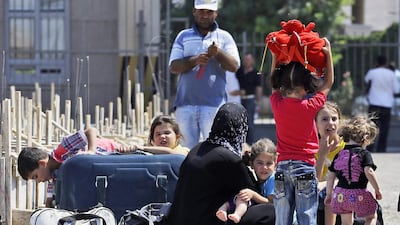Who could fail to have sympathy for the plight of refugees forced from their homes by warfare? This region is not short of them, whether it is Iraqis fleeing the sectarian violence in their homeland, Palestinians living in impoverished conditions with no idea if they will ever return home, or the latest exodus of Syrian refugees.
But while the focus deserves to be on those who often have no more than the clothes they were wearing when they fled and who bear the physical and psychological scars of their experience, some level of thought also ought to be paid to the host communities in neighbouring countries.
As The National reported yesterday, the latest place to feel the strains of an influx of refugees is Gaziantep, a southern Turkish city of 1.5 million people that is now home to about 200,000 Syrians. Some Syrians who fled with money are pricing local families out of the housing market by paying higher rents, while those that fled with nothing are driving wages down by offering to work for half the pay rate of Turkish workers.
Inevitably, this is causing tension with some residents. Some insist there is no problem but when a Syrian driver injured a Turkish woman and her child in a traffic accident recently, a crowd formed and marched to the area of town settled by Syrians, chanting: “Turkey belongs to us!”
What should happen? Nobody is advocating that a country should refuse refuge to those genuinely in fear for their safety or that the primary focus is not the refugees’ plight. However, there also remains a duty on countries bordering conflict zones and the international community generally to address the strains that these refugee populations cause.
In the case of Syria, there seems little prospect of a peaceful resolution in the short or medium term that would allow the refugees in Turkey, Lebanon, Jordan and Iraq to return home. In Turkey, part of the immediate solution might be to move refugees more evenly around the country, while still allowing big enough communities of refugees so that they can have mutual support of their fellow Syrians.
The West also has a role to play. Since they are doing little to resolve the Syrian civil war, Western countries ought to do more to help deal with its consequences by helping genuine refugees – including allowing considerably more of them to settle within their borders. The duty to those who flee in fear goes beyond just providing a temporary safe haven.

